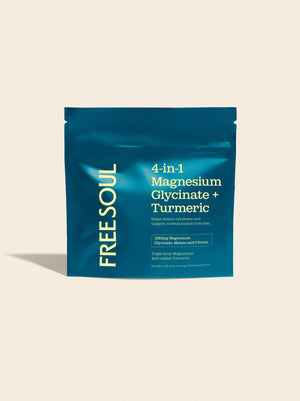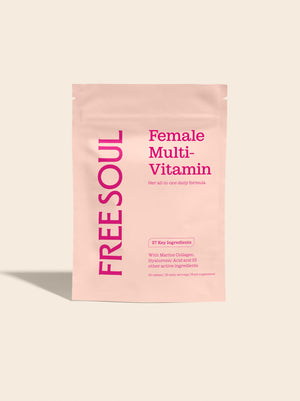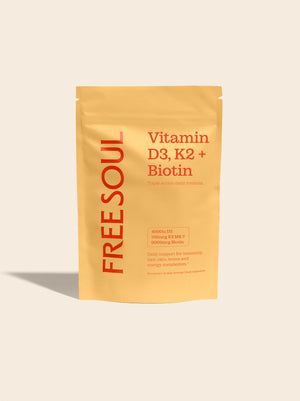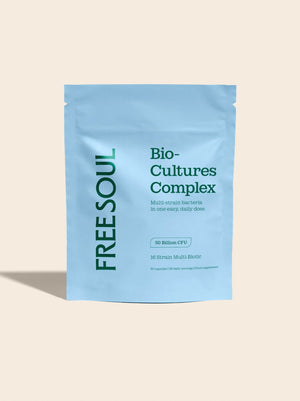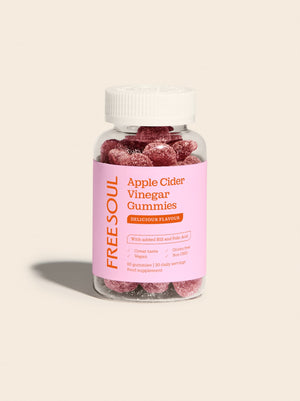What are Adaptogens and what do they do?
So, what are adaptogens, exactly? An excellent question, and precisely what we’re here to explain. In the words of Natalie Rouse, Registered Nutritionist (RNutr) and Head of Nutrition at Free Soul, “Adaptogens are herbs, roots, mushrooms, and other plant substances used in herbal medicine to help ease the body’s stress response”.
These plant-based allies have been used for centuries, but today, we’re breaking down the science of how they work and why they’re particularly helpful for women who are handling hormonal shifts and the non-stop merry-go-round of modern life.
How do Adaptogens work in the body?
The clue is in the name. Adaptogens are plants that are traditionally used to help the body adapt to physical and emotional stress. When you’re feeling the pressure, your body activates a system called the HPA axis. This system helps regulate things like your energy levels, mood, digestion, and even your immune response.
“Adaptogens are thought to support this natural process and may also play a role in cellular protection mechanisms – like helping cells recover from everyday stressors, such as poor sleep and a busy schedule”, says Natalie.
While adaptogens don’t eliminate stress, many people swear by them for their ability to boost mental and physical resilience when the going gets tough. They’re like your steadying sidekicks, helping you feel more like yourself while your body does the heavy lifting.
Adaptogens for women – why they matter more than ever
According to the American Psychological Association, women are more likely to report higher stress levels, and research by the Priory Group found that stress levels are 50% higher in women than in men. Throw hormonal fluctuations into the mix, and it’s no wonder maintaining emotional balance can be an uphill battle for many women.
Stress doesn't only affect your mood, it can also intensify hormonal symptoms, such as those of PMS.
During life stages like perimenopause and menopause, stress levels often rise significantly higher. Combined with the mental load and multitasking that many women juggle daily, and you’ve got a lot of fuel on the stress bonfire.
“Adaptogens for women, while not a cure-all, can be a natural way to help steady the system,” explains Natalie. “They can be a useful addition to a routine if you’re dealing with a lot of stress, handling hormonal fluctuations, or just looking for some day-to-day support.”
What are the benefits of taking Adaptogens?
These are some of the top adaptogens benefits and the reasons they are so often found in wellness routines:
- Feeling more resilient – Adaptogens are traditionally used to help the body manage emotional and physical stress
- Powering through – Some may support energy metabolism, so you can keep going even when you’re running on empty
- Thinking clearly – Certain adaptogens are used to support cognitive function, including memory and focus
- Staying steady – Many are taken to help ease hormonal fluctuations and support a more balanced inner state
For many women, they’ve become a small but mighty part of a wider self-care toolkit.
Key Adaptogens and their benefits
Different plants mean different properties. Here are some of the most popular adaptogens and how they’re traditionally used in wellness routines.
For stress and mood
- Ashwagandha – Popular for helping to manage stress and support a calmer state of mind
- Rhodiola rosea – Often taken to help the body adapt to mental and physical stress
For energy and fatigue
- Cordyceps – Has been studied for its role in energy metabolism and reducing fatigue
- Siberian ginseng (Eleuthero) – Research has suggested it may support aerobic performance by improving oxygen use and energy production
For brain fog and focus
- Lion’s mane – A functional mushroom loved for its potential cognitive benefits, it’s often used to improve mental clarity
- Rhodiola rosea – Has also been studied for its effects on learning and memory
For sleep and relaxation
- Ashwagandha – Also valued for its calming properties and is commonly taken as part of a wind-down routine
- Holy Basil (Tulsi) – Traditionally used to support relaxation in the day or evening
For hormonal support
- Ashwagandha – often used to promote hormonal balance, it has been researched for its impact on symptoms during perimenopause
- Maca – a root traditionally used to support hormonal wellbeing, particularly during times of change, such as menopause
What foods have Adaptogens?
Adaptogens can be a natural part of your day, and some are easy to incorporate through food and drink. Here are some options to try:
- Lion’s Mane and cordyceps – Functional mushrooms associated with focus and energy supporting benefits that can be cooked and enjoyed in meals
- Holy basil (Tulsi) – A herb often brewed as a tea to support relaxation
- Turmeric – Adds both flavour and potential antioxidant properties to dishes
- Maca root – Typically comes in powdered form and has a nutty taste that blends well into smoothies and energy bars
- Ginseng and liquorice root – Are commonly found in teas and are traditionally enjoyed for their stress and energy-supporting qualities
- Ashwagandha, Rhodiola Rosea, Reishi Mushrooms – Adaptogens like these are better consumed in supplement form due to their strong or not particularly palatable flavour
Supplements will also often contain more concentrated extracts than food forms, so you get a consistent dose for the best possible results.
Are Adaptogens safe? What you should know
Adaptogens are generally considered safe for use when taken in the suggested dose. They have a long history of use in traditional medicine, but as with any supplement, their suitability depends on the variety and the person taking it.
If you’re pregnant, breastfeeding, taking medication, or managing a health condition, take extra care. Check in with your GP or a healthcare professional before taking a new supplement.
“Be aware that adaptogens often come in blends. Read the label carefully so you know exactly what you’re taking. When used alongside good nutrition, self care, and rest, adaptogens can be a gentle way to support your body”, says Natalie.
Which Adaptogens are best for me?
This depends on the kind of support you’re looking for. Feeling stressed? Low on energy? A good night’s sleep evading you? Struggling to focus? Whatever your main concern, look for an adaptogen that is traditionally used to help in that area – the list above is a great place to start.
It’s a good idea to introduce one adaptogen at a time so you can see how your body responds, and then add another to your routine if needed. If it has the desired effect, you can always add another to your routine.
This step-by-step approach will also help you see what’s working and build an adaptogen routine that supports your overall well-being.



